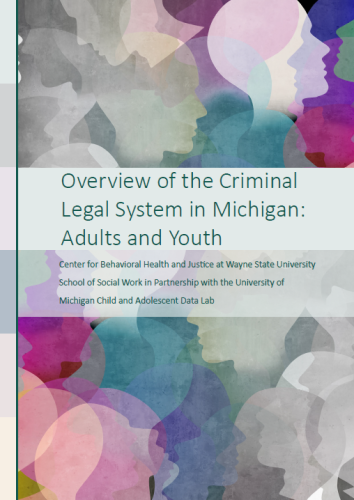Comprehensive report illuminates gaps in Michigan’s criminal legal data and offers a roadmap to data integration
 A new data landscape report released today provides a comprehensive snapshot of Michigan’s criminal legal system for adults and youth. This detailed report pulls together publicly available data to provide a picture of what the data can tell us and, perhaps more importantly, what it cannot.
A new data landscape report released today provides a comprehensive snapshot of Michigan’s criminal legal system for adults and youth. This detailed report pulls together publicly available data to provide a picture of what the data can tell us and, perhaps more importantly, what it cannot.
At present, our data systems have substantial issues with consistency, accuracy, and transparency. For example, the number of youth in juvenile detention across the state is unknown, and it is impossible to measure recidivism to determine if interventions are successful. When our state and local public safety institutions cannot speak to each other or to the public, individuals are further marginalized and fall through the cracks—missing data is missing people.
“How can you propose reforms, let alone enact them, when you can’t understand the problem?” said Chief Justice Bridget McCormack earlier this year. “Data is the key to understanding and addressing disparities in our justice system.”
The report titled “Overview of the Criminal Legal System in Michigan: Adults and Youth,” was coauthored by the Center for Behavioral Health and Justice (Wayne State University School of Social Work) and the Child and Adolescent Data Lab (University of Michigan School of Social Work ) with support from the Public Welfare Foundation and the Michigan Justice Fund.
The report seeks to highlight gaps in the data and offer a roadmap for how to move forward. The report builds upon past work in the state including the Michigan Joint Task Force for Jail and Pretrial Incarceration and will inform the launch of the Michigan Data Convening Project led by Lieutenant Governor Garlin Gilchrist II and supported by the Michigan Justice Fund. The project will bring together stakeholders from across the criminal legal system to develop long-term plans for Michigan’s data improvement later this month.
The manner in which data is collected, stored, and shared across Michigan’s criminal legal system for adults and youth has significant impacts on all aspects of public safety and criminal justice in our state. By creating a new cross-system data infrastructure, Michigan will lead the nation and move closer to becoming a safe and just home for all Michiganders.
About the Center for Behavioral Health and Justice: The Wayne State University School of Social Work Center for Behavioral Health and envisions communities in which research, data, and best practices are used by multiple stakeholders to enhance the optimal well-being of individuals with mental illness and/or substance use disorders who come into contact with the criminal/legal system. Learn more
About Public Welfare Foundation: For over seventy years, Public Welfare Foundation has supported efforts to advance justice and opportunity for people in need. Today, our efforts focus on catalyzing a transformative approach to justice that is community-led, restorative, and racially just through investments in criminal justice and youth justice reforms. These efforts honor the Foundation’s core values of racial equality, economic well-being, and fundamental fairness for all. Learn more
About the Michigan Justice Fund: The Michigan Justice Fund is a collaborative fund committed to promoting and advancing the prosperity and dignity of Michigan residents by stemming the flow of individuals into the youth and criminal justice systems, supporting the investment of public dollars to community-driven alternatives to incarceration and detention, and by ensuring those who are returning home after incarceration or detention receive the support they need to flourish. Learn more
Report citation: Kubiak, S.P., Gilbert, T.T., Ryan, J.P., Victor, G. (2021) "Overview of the Criminal Legal System in Michigan: Adults and Youth." Edited by Jessica L. Best. Designed by Lyz Luidens.